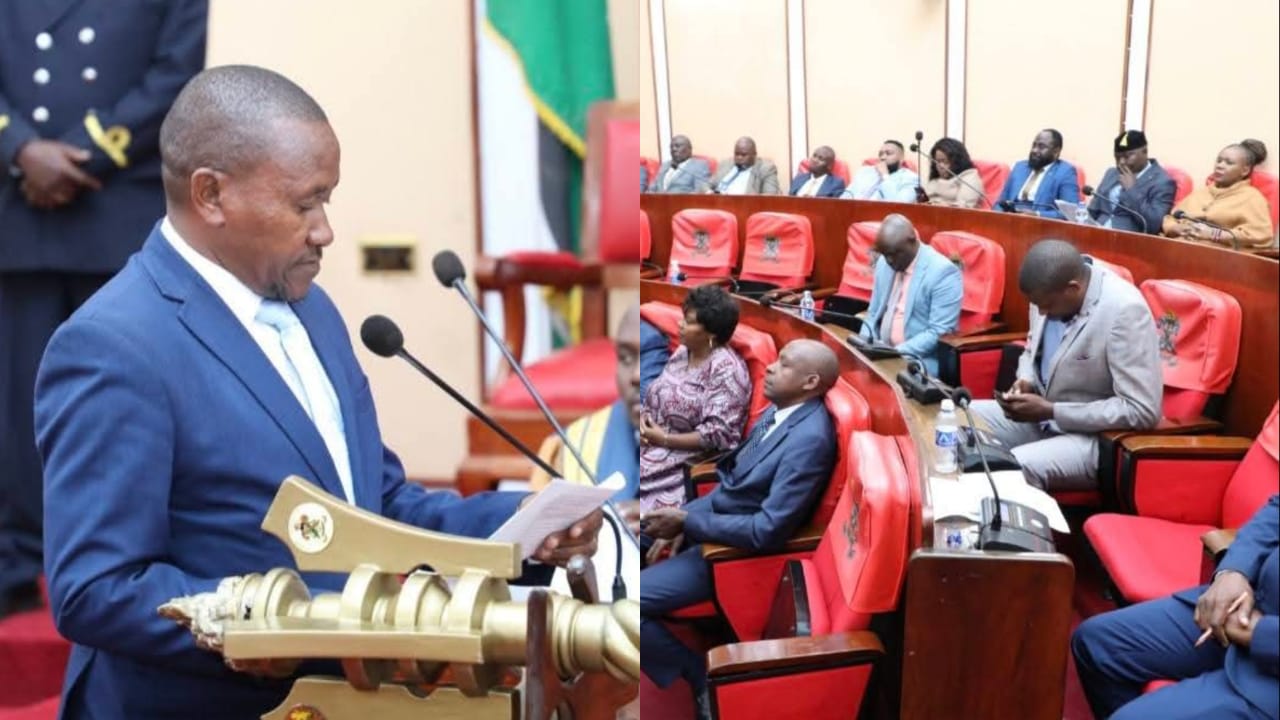 PAIC Chairperson Phillip Ndolo of Mitaboni Ward presents Auditor General’s findings for year ended 30th June 2023. Photo Andrew Mbuva.
PAIC Chairperson Phillip Ndolo of Mitaboni Ward presents Auditor General’s findings for year ended 30th June 2023. Photo Andrew Mbuva.
By Andrew Mbuva
The Machakos County Assembly has officially adopted a detailed report by the Public Accounts and Investments Committee (PAIC) that exposes significant irregularities in the county’s revenue management for the financial year ending June 30, 2023.
The report, which was tabled by PAIC Chairperson Phillip Ndolo of Mitaboni Ward, was based on the Auditor General’s findings and has prompted calls for immediate reforms within the County Executive’s financial systems.
According to the Auditor General’s assessment, the County Executive received a qualified opinion—an indication that while the financial statements generally presented the county’s financial position fairly, there were notable issues that affected their credibility and completeness.
One of the major concerns raised was the overstatement of revenue. The county reported that it had collected Kshs. 1.43 billion in own-source revenue, yet an audit of the cashbooks revealed that the actual amount collected by the end of the financial year was only Kshs. 1.38 billion. This discrepancy of Kshs. 46.4 million was attributed to the failure to observe standard end-of-year accounting procedures.
Notably, transactions from July 1st to July 20th, 2023—outside the financial year—were improperly included in the 2022/2023 statements.
Another alarming finding was the non-disclosure of outstanding revenue arrears. Land rate arrears totalling over Kshs. 38 billion, and stall and kiosk rent arrears amounting to Kshs. 5.5 million, were not reflected in the financial statements.
Although the accounting officer defended this omission by citing the cash basis of accounting, the committee found the lack of disclosure problematic for transparency and financial planning.
The report also pointed to unsupported public health revenue, with Kshs. 120.3 million collected from health facilities not backed by necessary documentation such as Mpesa paybill statements, bank records, or hospital fee reports. This raised serious accountability concerns, especially given the magnitude of the unverified amount.
Additional issues included failure to reconcile bank accounts for several months, misclassification of livestock-related revenue under cess fees, and the absence of regulations to guide the implementation of various county revenue laws.
Despite the enactment of several key laws, such as the Finance Act and Liquor Licensing Act, the lack of accompanying regulations has created legal and operational gaps in revenue collection.
In light of these findings, the PAIC made several far-reaching recommendations. These included enforcing strict adherence to financial cut-off procedures, full disclosure of revenue arrears, monthly or quarterly reconciliation of revenue accounts, development of revenue collection regulations, and submission of all relevant documentation to the Auditor General.
The committee also emphasized the need for stronger internal controls and better coordination with the National Treasury to avoid delays in account closures.
Ndolo, while presenting the report, stressed the importance of transparency and accountability in public finance. He noted that although some financial statements had since been restated to address errors, the initial oversights exposed fundamental weaknesses in internal audit mechanisms and compliance.
The adoption of this report now places the responsibility on the County Executive to implement the recommended measures within the specified timelines.
The PAIC expressed its hope that with stronger financial oversight and operational reforms, future audit reports would reflect improved standards of public financial management in Machakos.